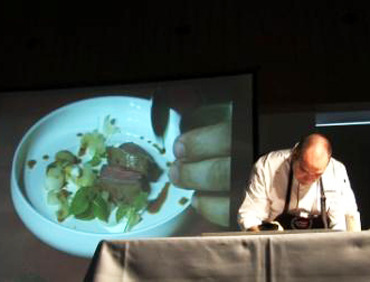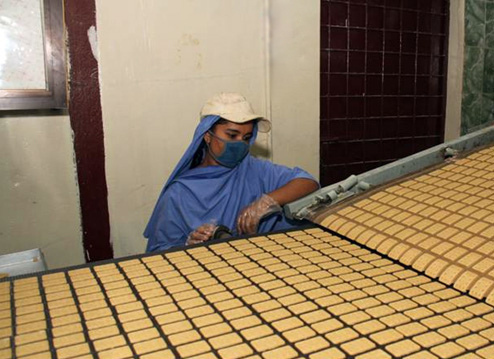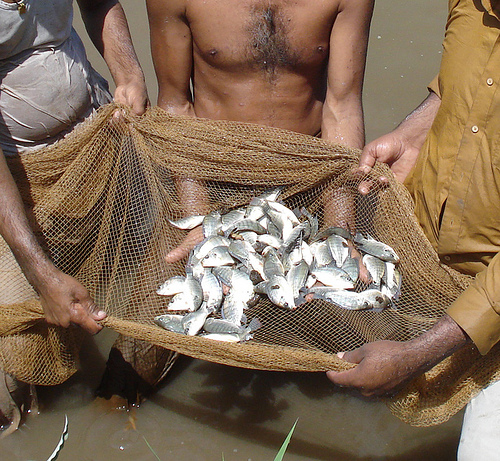
Dutch Chef Eric Troost prepares an upscale dish using U.S. beef during a cooking demonstration for about 130 Belgian chefs Sept. 24. The demo was part of the first U.S. beef tasting event held in Belgium, which was hosted by the Foreign Agricultural Service (FAS) office in The Hague, Netherlands, and the U.S. Meat Export Federation (USMEF). The tasting was part of ongoing efforts to help expand U.S. beef exports to the European Union (EU). (Photo courtesy FAS The Hague)
The European Union (EU) is a relatively new market for U.S. beef exports. It wasn’t until August 2009 when the United States began exporting high-quality beef (marbled with a high fat content) to the EU under a negotiated tariff rate quota for non-hormone treated beef. Read more »
Tags: beef, Belgium, European Union, Exports, FAS, MAP, National Export Initiative, Netherlands, President Obama, The Hague, Trade
 Economic Growth, International, Trade
Economic Growth, International, Trade
On October 16, World Food Day, it is hard to not be struck by how lucky we are in the United States. We have abundant food that costs us less to produce, on a per unit basis, than almost any other country in the world. Our farmers and ranchers produce more than we need, allowing us to be a powerhouse in global exports. And our food supply is among the safest of all the world’s nations.
All that abundance and security has been underpinned by science and know-how. Between the 1940s and the 1970s, agriculture science blossomed in what has become known as the Green Revolution. Thanks to the research done by Norman Borlaug, the “Father of the Green Revolution,” working with researchers around the world, developed high-yielding varieties and modern production practices that helped save untold numbers of people from starvation. Read more »

A Bangladeshi factory worker monitors the production of biscuits made from U.S. donated wheat. The donation was delivered to the World Food Programme, a Foreign Agricultural Service (FAS) McGovern-Dole program participant that works to provide food assistance in more than 73 countries. The biscuits will be distributed to about 2,000 schools in the poorest areas of Bangladesh. (Photo courtesy U.S. Embassy New Dehli)
Approximately 350,000 school children in Bangladesh now have access to a daily snack after the U.S. government recently donated more than 10,000 metric tons of wheat to the country through the Foreign Agricultural Service’s (FAS) McGovern-Dole Food for Education Program. Read more »
Tags: Bangladesh, Dan W. Mozena, FAS, Feed the Future, Food Security, George McGovern, McGovern-Dole Food for Education Program, President Obama, Trade, World Food Prgoramme
 Food Security, International, Trade
Food Security, International, Trade

Workers hold a net full of tilapia at a fish farm in Pakistan. The fish are part of the American Soybean Association’s (ASA) World Initiative for Soy in Human Health (WISHH) program called “FEEDing Pakistan.” The Foreign Agricultural Service (FAS) helped fund the program, which aims to enhance the country’s growing aquaculture sector through trial fish feeding using high–protein, floating fish feed produced from U.S. soybean meal. (Courtesy World Initiative for Soy in Human Health)
An innovative Foreign Agricultural Service (FAS)-funded program in Pakistan is not only improving local diets, but is creating jobs, training workers and helping create a thriving aquaculture industry with U.S. soy. Read more »
Over the last three years, USDA’s Agricultural Marketing Service (AMS) has worked with the peanut and dairy industries to create a government-hosted electronic trade document repository. The eTrade Document Exchange (eTDE) System, funded by USDA’s Foreign Agricultural Service through the Market Access Program, makes electronic trade documents, including official certificates, available securely through the Internet to facilitate the domestic and international movement of U.S. agricultural products.
This system provides users with the ability to access commodity-related trade documents as PDF files that can be used to verify hard copy documents or to eliminate the use of hard copy documents entirely. It allows authorized product owners, buyers, carriers, brokers, and government port agents access to critical information around the clock and around the world.
USDA collaborates with trade associations to provide this information as an export service to the supply chain. The certificates available in the repository are provided by a variety of document providers. Some certificates are provided by USDA, some by programs under department certification, and some from commercial sources that operate independently. USDA validates the identity of each document provider and has security controls in place to ensure that certificate data obtained from providers remains unaltered once it is posted to the site. Read more »
“Food isn’t traditionally thought of as a diplomatic tool, but sharing a meal can help people transcend boundaries and build bridges in a way that nothing else can.”
Secretary of State Hillary Rodham Clinton
Some of the nation’s top chefs have signed on to help promote American food and culinary traditions around the world through the new American Chef Corps. The corps is part of the Diplomatic Culinary Partnership Initiative, launched earlier this month by the Department of State and the James Beard Foundation. USDA is delighted to support this initiative, which is an excellent complement to our ongoing work highlighting the quality, variety, safety and sustainability of U.S. food products to our customers around the world. Read more »



